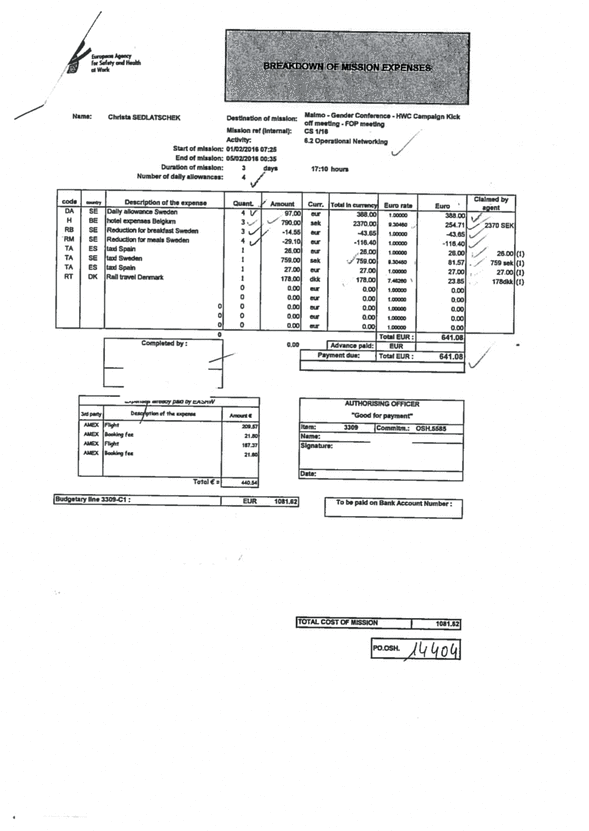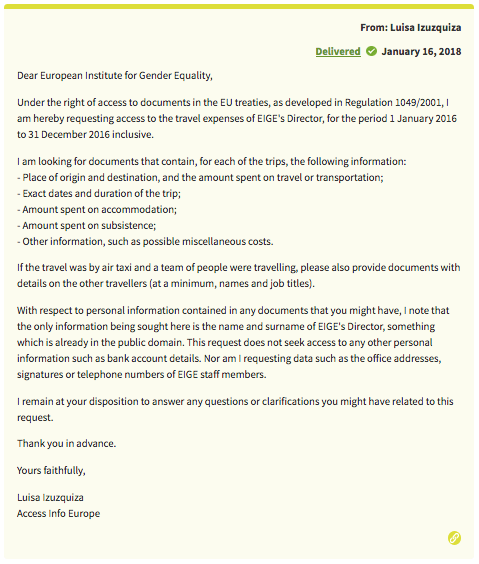TRANSPARENCY IS THE
NEW STANDARD
FIFTY EU AGENCIES RELEASE THEIR TRAVEL EXPENSES
 EU agencies are the decentralised, executive, and independent bodies of the European Union. They are established and created to carry out specific tasks, such as the supervision of the banking sector (European Banking Authority), promotion of gender equality (European Institute for Gender Equality), law enforcement (Europol), or control and surveillance of the EU’s external borders (European Border and Coast Guard Agency, known as Frontex).
EU agencies are the decentralised, executive, and independent bodies of the European Union. They are established and created to carry out specific tasks, such as the supervision of the banking sector (European Banking Authority), promotion of gender equality (European Institute for Gender Equality), law enforcement (Europol), or control and surveillance of the EU’s external borders (European Border and Coast Guard Agency, known as Frontex).
Now, the publication of their highest representative’s travel expenses outlines the most comprehensive picture obtained to date on where, how and how often the EU’s top officials travel, and how much does this cost.
This picture is also a positive one: the analysis of the data by Belgian news outlet Knack shows responsible and proportionate spending. The highest spender is Mario Draghi’s European Central Bank (ECB) with four trips of more than € 20 000.
Read Knack’s analysis: Transparency is the new standard »
“We welcome the EU agencies’ willingness to make this information available to the public as an important step towards greater accountability,” stated Luisa Izuzquiza, Communications Officer at Access Info Europe.
Prior to submitting these requests, only the European Ombudsman had been publishing this information proactively, while the European External Action Service had committed to do so and have now done so.
 Access Info submitted requests at the end of 2017 to the remaining 52 agencies, of which 48 agencies provided data. Two agencies (Europol and ACER) did not yet respond to the requests, and one agency’s documents are still pending disclosure (ENISA).
Access Info submitted requests at the end of 2017 to the remaining 52 agencies, of which 48 agencies provided data. Two agencies (Europol and ACER) did not yet respond to the requests, and one agency’s documents are still pending disclosure (ENISA).
Only one agency (Euratom) denied access asserting that the requested data “pertains to the personal information of Commission officials, the disclosure of which would undermine the protection of privacy and integrity of individuals.” Access Info has challenged this full refusal with an administrative appeal (“confirmatory application”). We note that the European Commission in 2016 first applied a privacy exception to travel expense data but later abandoned that line of argument.
The disclosed documents also show great levels of disparity and a lack of uniformity in how this information is being collected and stored at the EU level.
A compilation of travel expenditure for the whole year, broken down per trip and type of expense, and released in a PDF format, was the most common type of disclosure. Other agencies chose to release scanned copies of their mission statements, while only two agencies provided the information in a reusable format.
“The next step now would be for the agencies make this data proactively available to the public,” said Helen Darbishire, Executive Director of Access Info Europe. “This is not only the desirable transparency standard — it’s also an achievable reality, as the European Commission, the EEAS and the EU Ombudsman have demonstrated.”
The agencies’ disclosures now leave the European Parliament at the bottom of the transparency league; transparency of MEP’s travel expenses is still subject to litigation before the General Court of the EU by a team of investigative journalists.
All access to documents requests and all travel expenses for each of the EU agencies’ directors are available here, and per agency below:
Browse the travel expenses of the EU agencies that publish them proactively:
European Ombudsman
European External Action Service (EEAS)
Browse and download the travel expenses of the following EU agencies:
European Investment Bank (EIB)
European Foundation for the Improvement of Living and Working Conditions (Eurofound)
Fusion for Energy (F4E)
European Union Institute for Security Studies (EUISS)
European Court of Auditors (ECA)
ECSEL Joint Undertaking
European Data Protection Supervisor (EDPS)
European Central Bank (ECB)
European Committee of the Regions (CoR)
European Economic and Social Committee (EESC)
Office of the Body of European Regulators for Electronic Communications (BEREC Office)
Community Plant Variety Office (CPVO)
European Agency for Safety and Health at Work (EU-OSHA)
European Border and Coast Guard Agency (Frontex)
European Agency for the operational management of large-scale IT systems in the area of freedom, security and justice (eu-LISA)
European Asylum Support Office (EASO)
European Aviation Safety Agency (EASA)
European Banking Authority (EBA)
Europejskie Centrum ds. Zapobiegania i Kontroli Chorób (ECDC)
European Centre for the Development of Vocational Training (Cedefop)
European Chemicals Agency (ECHA)
European Environment Agency (EEA)
European Fisheries Control Agency (EFCA)
European Food Safety Authority (EFSA)
European GNSS Agency
European Institute for Gender Equality (EIGE)
European Insurance and Occupational Pensions Authority (EIOPA)
European Maritime Safety Agency (EMSA)
European Medicines Agency (EMA)
European Monitoring Centre for Drugs and Drug Addiction (EMCDDA)
European Union Agency for Law Enforcement Training (CEPOL)
European Union Agency for Railways (ERA)
The European Securities and Markets Authority (ESMA)
European Training Foundation (ETF)
European Union Agency for Fundamental Rights (FRA)
European Union Intellectual Property Office (EUIPO)
Single Resolution Board (SRB)
The European Union’s Judicial Cooperation Unit (Eurojust)
Translation Centre for the Bodies of the European Union (CdT)
European Defence Agency (EDA)
European Union Satellite Centre (SatCen)
Education, Audiovisual and Culture Executive Agency
Executive Agency for Small and Medium-sized Enterprises (EASME)
European Research Council Executive Agency (ERCEA)
Consumers, Health, Agriculture and Food Executive Agency (Chafea)
Research Executive Agency
Innovation & Networks Executive Agency (INEA)
European Institute of Innovation and Technology (EIT)
European Union Agency for Network and Information Security (ENISA)
EU agencies that refused access to the information:
EURATOM Supply Agency (ESA)
EU agencies that didn’t respond to the access to documents request:
European Police Office (Europol)
Agency for the Cooperation of Energy Regulators (ACER)
For more information, please contact:
Helen Darbishire, Executive Director | Access Info Europe
Send an e-mail or call +34 609 707 264
Cover photo: European Parliament via Flickr (CC BY-NC-ND 2.0)
